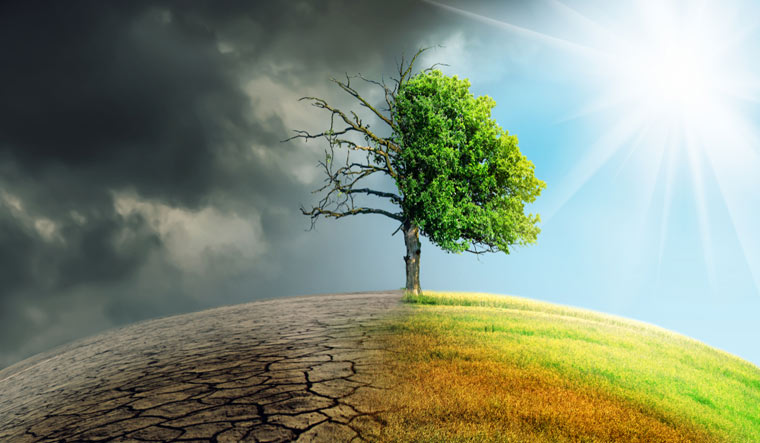The very next day of the US Elections, another major world event will take place— the US will pull out from the Paris Climate Accord. The Paris Agreement opened for signature on April 22, 2016 – Earth Day – at UN Headquarters in New York. It was enforced on November 4, 2016, 30 days after the so-called “double threshold” (ratification by 55 countries that account for at least 55 per cent of global emissions) had been met. In June 2017, Donald Trump announced that the US would cease all participation in the Paris Agreement on climate change mitigation, and begin negotiations to re-enter the agreement "on terms that are fair to the United States, its businesses, its workers, its people, its taxpayers.”
What will happen after the US pulls out of the agreement?
Delhi-based inventor, environmentalist Anadish Pal says, “If the USA is backing off, others too will become reticent; because, many, like India, simply copy paste US policies. Nations like Vanuatu have to be terribly mindful because they will simply sink once the ocean waters rise. However, the affected countries are small and have limited political/global clout. The world (a euphemism) as such is preparing for climate change anyway. This pandemic is (or is being treated) as a social/political experiment to immobilise, localise or relocate people en masse. Many nations, including France, already do not use fossil fuels at all (France already produces 75 per cent of its electricity from nuclear reactors and produces it very cheap). The secret of cheap and reliable nuclear energy is commercially available from the French; but unfortunately when countries like India place multiple orders, they prefer the political leverages over efficiency or cost.”
“So, it is now left mostly to China and India to cut down emissions. The small fry really do not matter. The US was not mining its coal till recent past for a larger interest, that was to conserve its resources till the last—an exigency plan of sorts. But Trump undid it. It suits the rest of the world immensely, as America depletes its coal (and other mineral resources in the name of employment of the miners) it retards the technological advancement of the US, also denudes it of its precious resources and adds to the environmental pollution in the US. The US is playing this game consciously, as they want China, India and other similarly placed countries to play the same game—wildly tap whatever mineral wealth you have. India has already fallen prey to it. Post China ban, Indian mineral exports to China have more than doubled. It looks rosy, as the balance of trade currently is in India's favour. But at what cost? Once you lose your mineral wealth, you are dependent on others for any material input.”
“Sane nations (like France) have already corrected their dirty act, but they cannot do more than that, they realise it after the Trump pullout which tacitly encouraged China and India to continue as they are. However, China and India too cannot indefinitely continue to mine their nations and continue to burn fossil fuel. Eventually, they will be totally depleted and frustrated—that is the time when fully automated western manufacturing and software will strike. As the human needs are being remodelled post-pandemic, a few digital devices, a secure contained room and literally piped food would become the bedrock of human existence post pandemic. Diversity of hardware manufacturing, once gone, would catapult the gone-out-of-rezoning western nations (including Japan) into the centrestage of industry and control. The whole scenario of industry and its setup is going through a metamorphosis.”
Has the agreement been working?
New York-based researcher on climate policy Kabir Singh says, “It’s hard to state ‘officially’ yes or no, but in my opinion, 'no'. The lack of a binding agreement and the emphasis on flexibility, accountability, and transparency have resulted in uneven outcomes (as is obvious) and the oversight of key principles of climate justice. The Paris Agreement has favoured individual (countries) at-will action at the expense of a much needed sense of global public responsibility. Its emphasis on transparency and accountability mechanisms for nationally-appropriate actions has pushed aside crucial strands of global climate policy, particularly much-needed progress on the questions of how responsibility for climate impacts and adaptation are distributed and who pays.”
“In March, the Trump administration undid Obama's fuel economy policy, essentially increasing emissions amidst a climate crisis. Besides, the Senate has leaders who don't believe in science or don't want to believe in climate change/ global warming. In such a scenario, what can people do to take matters into their own hands? You have said that the accord isn't binding. In that case should steps be taken to make it so?”
Anadish Pal says, “They do believe in science, but are purposefully avoiding to accept it, because they planned to use their avoidance of science as a weapon to destroy China and India completely. They are cruel enough to have readied for the exigencies of global warming following the post-pandemic model, as I pointed out earlier here. For well thinking entities, possibly, approaching the International Court of Justice could be an alternative. Otherwise, even Greta Thunberg has acquiesced after the post pandemic emergency—she and her ilk quite like this kind of global emergency. It is a win-win situation for die hard climate activists and big industry both. Both are pleased with the effects of post-pandemic social realities. Only people who suffer are the small entities, the individual, whose sense of freedom and mobility is almost gone for good.”
“Most importantly, I think it is absolutely essential for people to understand that the climate crisis is inseparable from issues of economic and social injustice – many have no choice but to know this. If human life was truly valued equally everywhere, questions of costliness that have stalled drastic global political action on climate change would probably not be taking centrestage. To combat climate change at a systematic level, it is very important that people and policy-makers (who are also people) continue to urgently fight for the justice and liberation of all people,” Kabir Singh says.
Should steps be taken to make the climate accord binding? Also, why isn't it binding already? Doesn't it give leeway to nations like China to step away from it?
Kabir Singh says, “The Paris Agreement is not binding because it emphasised flexibility in reaching overall goals, rather than having clear-cut targets and deadlines. This may have been beneficial in terms of participation and support for the treaty in general, but clearly it is compromising the necessary scale and time-sensitive implementation of mitigation and adaptation efforts. I think steps should be taken to make the Paris Agreement, or perhaps the next major global climate accord, binding. This is much easier said than done, but it is crucial that principles of equitable climate action become a norm for governments very, very soon.
How is the climate going to be like in 40-50 years if the US continues with its emissions?
Anadish Pal says, “The climate is definitely going to go out of hands in the next 20 years or so; after that, as India and China on their mutual path of destruction would be down on their knees, the western nations will strike back and put clamps on everybody citing the climate apocalypse.”
What will the world look like if the heating soar beyond 2 deg.C?
Anadish Pal says, “Quite obviously, the ocean levels will rise, submerging large swathes of coastal areas. There would be more violent weather episodes, which definitely would provide cunning business opportunities in rebuilding efforts. Individual human life would take a beating, amidst all this. Anyways, human dignity is hardly of any value in these trumpeted up pandemic times, and this spirit of trampling upon human rights, the quality of individual life would surely be almost totally eroded. Let us all be reminded of the fate of the Marshall islanders— big corporations and powerful world leaders hardly bother for human life, they never did and they would never do that ever. Unless a miracle happens.”
“Major coastal and/or low-lying cities – such as Mumbai, New York, and Lagos – will be upended by sea-level rise if warming surpasses 2 deg C. The ongoing wildfires in California are a vivid foreshadowing of worsening hot and dry conditions across many parts of the world. Many of the impacts of dryer conditions will be less visually dramatic, but just as harmful, including devastating consequences to our food systems. There will not be a corner of the world that won’t be hugely affected by 2 deg of warming, even if physical impacts are worse in some areas than others,” Kabir Singh adds.
Seeing how the US economy and the current leaders are so vested in the oil lobby, what can energy companies do to mitigate damage?
Kabir Singh says, “Energy companies must rapidly transition their fuel and utility source portfolios towards being clean, renewable, and sustainable (in the long-term). Equally as important, energy companies have a great potential for influence in policy-making, thus they must invest significantly in lobbying for climate-friendly policies at the state and federal level. This will help contribute to economy-wide changes (such as the price of carbon and economy-wide emissions targets) that will help set up a sustainable future. Further, energy companies should have a responsibility to promote and contribute to adaptation efforts across the US and world to minimise the loss of livelihoods that the unavoidable impacts of climate change are already causing. Lobbying for strong government-facilitated climate adaptation programmes should also happen on this front.”
What happens if Trump is re-elected?
Kabir Singh says, “The fight will become even harder, and the US will definitely stay out of the Paris Accord. Trump will probably continue to dismantle climate related policies and unjustly favor ‘cheap’ options and continue to put forth deceptive arguments that keep too much of the American public in favour of his actions. However, even though Biden winning will be tremendous for the US’ climate policies, the systemic issues at the root of the climate crisis (along with racial injustice and growing economic inequality) will not go away. We must continue to fight against these regardless of who wins the presidency in order to meaningfully and sustainably combat climate change.”






